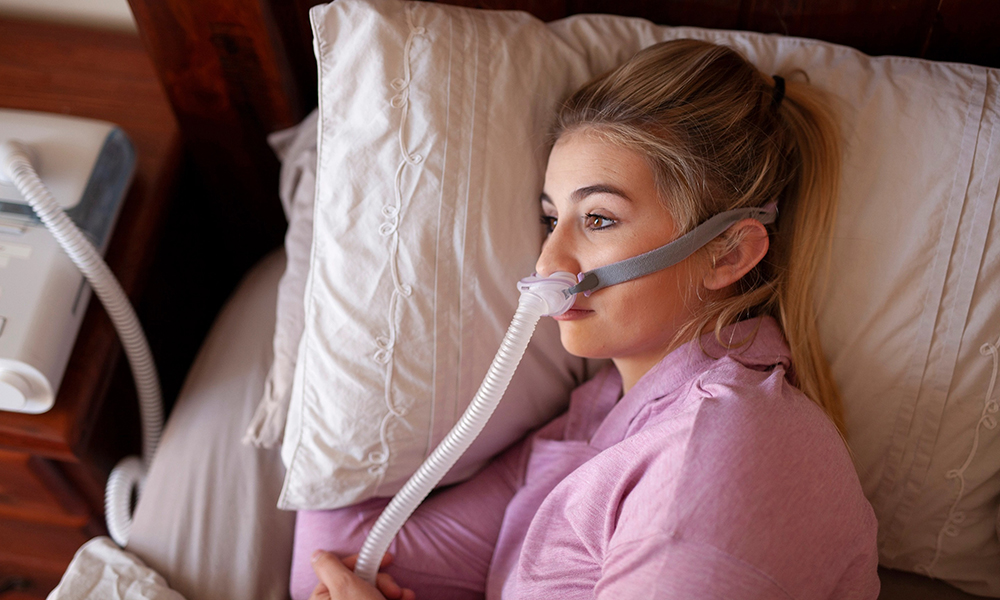
如果你在患新冠之前沒有睡眠問題,感染之后你可能出現(xiàn)睡眠障礙,,尤其是因?yàn)樾鹿谧≡褐委煹幕颊摺?/p>
這是《柳葉刀》(The Lancet)雜志發(fā)表的一篇最新研究論文的結(jié)論,。研究發(fā)現(xiàn),因新冠住院的患者普遍存在睡眠障礙,。
來(lái)自英國(guó)的研究人員在疫情開始后的前兩年內(nèi),,調(diào)查了約2,500名住院治療的新冠患者。他們發(fā)現(xiàn),,有62%的研究參與者出現(xiàn)了睡眠障礙,,并且這種情況可能至少持續(xù)一年。一些患者需要在醫(yī)院接受重癥護(hù)理,,但有些患者的病情并不嚴(yán)重,。
這是首次有研究強(qiáng)調(diào)了睡眠障礙和氣喘之間的聯(lián)系。這兩者都是較為常見的長(zhǎng)新冠癥狀,。研究人員表示,,焦慮和肌肉功能衰退這兩種與長(zhǎng)新冠有關(guān)的癥狀,也可能是新冠后產(chǎn)生睡眠問題的原因,。
因各種問題住院治療的患者,,普遍都會(huì)出現(xiàn)睡眠障礙。但研究人員發(fā)現(xiàn),,因新冠住院治療的患者,,平均睡眠時(shí)間比因其他原因住院的患者多65分鐘,而睡眠效果和規(guī)律性更低。
研究人員表示,,該項(xiàng)研究表明,,睡眠障礙可能是長(zhǎng)新冠的“重要驅(qū)動(dòng)因素”,這意味著“對(duì)于因?yàn)樾鹿谧≡褐委煹幕颊?,可以針?duì)睡眠質(zhì)量不佳進(jìn)行干預(yù)性治療,,用于管理共患病和恢復(fù)期,從而改善患者的治療結(jié)果,?!?/p>
加州大學(xué)圣地亞哥分校(University of California San Diego)的研究人員在對(duì)這篇論文的評(píng)論中指出,睡眠障礙“非常普遍”,,全球約有10億人受到阻塞性睡眠呼吸暫停的影響,,約有10%的成年人深受失眠的困擾。
因此,,他們寫道,,建議已出院的所有新冠患者篩查睡眠和呼吸問題,仍為時(shí)尚早,。
哪些人感染新冠后出現(xiàn)睡眠問題的風(fēng)險(xiǎn)最高,?
英國(guó)研究人員發(fā)現(xiàn),在曾因新冠住院的患者中,,存在下列特征的患者睡眠質(zhì)量較差:
? 女性
? 比睡眠質(zhì)量良好的患者更年輕
? 體重指數(shù)更高
? 此前曾被確診患有抑郁癥或焦慮癥
? 此前存在呼吸困難
? 此前睡眠質(zhì)量不佳
? 比睡眠質(zhì)量良好的患者飲酒量更低
有下列特征的患者在感染新冠后睡眠質(zhì)量最差:
? 吸煙者
? 先前被確診患有以下任一疾?。?/p>
o 焦慮癥
o 糖尿病
o 高血壓
o 腎病
研究人員的發(fā)現(xiàn)與2015年一項(xiàng)更大范圍研究的成果重疊。2015年的研究發(fā)現(xiàn),,有以下特征的老年人出現(xiàn)睡眠障礙的風(fēng)險(xiǎn)最高:
? 女性
? 有抑郁情緒
? 患有身體疾病
如何應(yīng)對(duì)與新冠有關(guān)的睡眠障礙
德克薩斯大學(xué)休斯敦健康科學(xué)中心(UTHealth Houston)和紀(jì)念赫爾曼德州醫(yī)療中心(Memorial Hermann)的首席傳染病和流行病學(xué)專家,、德克薩斯大學(xué)休斯敦健康科學(xué)中心新冠卓越中心(COVID-19 Center of Excellence)的傳染病主任劉易斯·奧斯特羅斯基博士對(duì)《財(cái)富》雜志表示,最新研究的結(jié)果“非常準(zhǔn)確”,。
奧斯特羅斯基表示:“我們經(jīng)常聽說(shuō)有人在急性新冠期間做了稀奇古怪的夢(mèng),,經(jīng)常有人抱怨在康復(fù)后長(zhǎng)期失眠,”無(wú)論人們是否因?yàn)樾鹿谧≡褐委?。這可能是因?yàn)樾鹿诓《救肭至巳梭w的中樞神經(jīng)系統(tǒng),。
他表示,下列建議通??梢詭椭颊邞?yīng)對(duì)在感染新冠后出現(xiàn)的睡眠障礙:
? 保持良好的睡眠衛(wèi)生,,包括固定睡覺時(shí)間,睡前逐步放松,,睡前幾個(gè)小時(shí)避免攝入咖啡因和其他刺激性物質(zhì)
? 服用有助于入眠的非處方膳食補(bǔ)充劑褪黑素
? 與醫(yī)生討論治療失眠的處方藥
他表示,,對(duì)于一些在新冠后出現(xiàn)睡眠問題的患者,基礎(chǔ)治療有很好的效果,。這是好消息,因?yàn)閷?duì)于新冠后睡眠障礙,目前沒有特效療法,。
對(duì)于存在睡眠問題的患者,,無(wú)論是否與新冠有關(guān),他建議:咨詢睡眠專家的意見,,而不是訂購(gòu)可在家完成的在線睡眠研究,。
他表示,睡眠專家“提供的服務(wù)”不只是睡眠研究,?!八哔|(zhì)量不佳有許多原因。尋找睡眠專家是一筆很有價(jià)值的投資,?!保ㄘ?cái)富中文網(wǎng))
翻譯:劉進(jìn)龍
審校:汪皓
如果你在患新冠之前沒有睡眠問題,感染之后你可能出現(xiàn)睡眠障礙,,尤其是因?yàn)樾鹿谧≡褐委煹幕颊摺?/p>
這是《柳葉刀》(The Lancet)雜志發(fā)表的一篇最新研究論文的結(jié)論,。研究發(fā)現(xiàn),因新冠住院的患者普遍存在睡眠障礙,。
來(lái)自英國(guó)的研究人員在疫情開始后的前兩年內(nèi),,調(diào)查了約2,500名住院治療的新冠患者。他們發(fā)現(xiàn),,有62%的研究參與者出現(xiàn)了睡眠障礙,,并且這種情況可能至少持續(xù)一年。一些患者需要在醫(yī)院接受重癥護(hù)理,,但有些患者的病情并不嚴(yán)重,。
這是首次有研究強(qiáng)調(diào)了睡眠障礙和氣喘之間的聯(lián)系。這兩者都是較為常見的長(zhǎng)新冠癥狀,。研究人員表示,,焦慮和肌肉功能衰退這兩種與長(zhǎng)新冠有關(guān)的癥狀,也可能是新冠后產(chǎn)生睡眠問題的原因,。
因各種問題住院治療的患者,,普遍都會(huì)出現(xiàn)睡眠障礙。但研究人員發(fā)現(xiàn),,因新冠住院治療的患者,,平均睡眠時(shí)間比因其他原因住院的患者多65分鐘,而睡眠效果和規(guī)律性更低,。
研究人員表示,,該項(xiàng)研究表明,睡眠障礙可能是長(zhǎng)新冠的“重要驅(qū)動(dòng)因素”,,這意味著“對(duì)于因?yàn)樾鹿谧≡褐委煹幕颊?,可以針?duì)睡眠質(zhì)量不佳進(jìn)行干預(yù)性治療,,用于管理共患病和恢復(fù)期,從而改善患者的治療結(jié)果,?!?/p>
加州大學(xué)圣地亞哥分校(University of California San Diego)的研究人員在對(duì)這篇論文的評(píng)論中指出,睡眠障礙“非常普遍”,,全球約有10億人受到阻塞性睡眠呼吸暫停的影響,,約有10%的成年人深受失眠的困擾。
因此,,他們寫道,,建議已出院的所有新冠患者篩查睡眠和呼吸問題,仍為時(shí)尚早,。
哪些人感染新冠后出現(xiàn)睡眠問題的風(fēng)險(xiǎn)最高,?
英國(guó)研究人員發(fā)現(xiàn),在曾因新冠住院的患者中,,存在下列特征的患者睡眠質(zhì)量較差:
? 女性
? 比睡眠質(zhì)量良好的患者更年輕
? 體重指數(shù)更高
? 此前曾被確診患有抑郁癥或焦慮癥
? 此前存在呼吸困難
? 此前睡眠質(zhì)量不佳
? 比睡眠質(zhì)量良好的患者飲酒量更低
有下列特征的患者在感染新冠后睡眠質(zhì)量最差:
? 吸煙者
? 先前被確診患有以下任一疾?。?/p>
o 焦慮癥
o 糖尿病
o 高血壓
o 腎病
研究人員的發(fā)現(xiàn)與2015年一項(xiàng)更大范圍研究的成果重疊。2015年的研究發(fā)現(xiàn),,有以下特征的老年人出現(xiàn)睡眠障礙的風(fēng)險(xiǎn)最高:
? 女性
? 有抑郁情緒
? 患有身體疾病
如何應(yīng)對(duì)與新冠有關(guān)的睡眠障礙
德克薩斯大學(xué)休斯敦健康科學(xué)中心(UTHealth Houston)和紀(jì)念赫爾曼德州醫(yī)療中心(Memorial Hermann)的首席傳染病和流行病學(xué)專家,、德克薩斯大學(xué)休斯敦健康科學(xué)中心新冠卓越中心(COVID-19 Center of Excellence)的傳染病主任劉易斯·奧斯特羅斯基博士對(duì)《財(cái)富》雜志表示,最新研究的結(jié)果“非常準(zhǔn)確”,。
奧斯特羅斯基表示:“我們經(jīng)常聽說(shuō)有人在急性新冠期間做了稀奇古怪的夢(mèng),,經(jīng)常有人抱怨在康復(fù)后長(zhǎng)期失眠,”無(wú)論人們是否因?yàn)樾鹿谧≡褐委?。這可能是因?yàn)樾鹿诓《救肭至巳梭w的中樞神經(jīng)系統(tǒng),。
他表示,下列建議通??梢詭椭颊邞?yīng)對(duì)在感染新冠后出現(xiàn)的睡眠障礙:
? 保持良好的睡眠衛(wèi)生,,包括固定睡覺時(shí)間,睡前逐步放松,,睡前幾個(gè)小時(shí)避免攝入咖啡因和其他刺激性物質(zhì)
? 服用有助于入眠的非處方膳食補(bǔ)充劑褪黑素
? 與醫(yī)生討論治療失眠的處方藥
他表示,,對(duì)于一些在新冠后出現(xiàn)睡眠問題的患者,基礎(chǔ)治療有很好的效果,。這是好消息,,因?yàn)閷?duì)于新冠后睡眠障礙,目前沒有特效療法,。
對(duì)于存在睡眠問題的患者,,無(wú)論是否與新冠有關(guān),他建議:咨詢睡眠專家的意見,,而不是訂購(gòu)可在家完成的在線睡眠研究,。
他表示,,睡眠專家“提供的服務(wù)”不只是睡眠研究?!八哔|(zhì)量不佳有許多原因,。尋找睡眠專家是一筆很有價(jià)值的投資,?!保ㄘ?cái)富中文網(wǎng))
翻譯:劉進(jìn)龍
審校:汪皓
If you didn’t have sleep issues before COVID, you just might after—particularly if the virus hospitalized you.
That’s according to a new study published in?The Lancet, which found that sleep disturbances were common among those who had been admitted because of the disease.
Such disturbances, found in 62% of study participants, were likely to last at least a year, the United Kingdom–based researchers noted after meeting with nearly 2,500 COVID patients hospitalized during the pandemic’s first two years. Some required critical care in the hospital, while others did not.
The study was the first to highlight the association between sleep disruption, a commonly reported symptom in long COVID, and breathlessness, another long COVID symptom. Anxiety and reduced muscle function also seemed to play a role in post-COVID sleep issues, and both have been linked to long COVID, the researchers noted.
Sleep disturbance is a common complaint among those who’ve been hospitalized for a variety of issues. Those who had been hospitalized with COVID, however, slept 65 minutes longer, on average, and saw lower sleep efficiency and regularity compared to patients who had been hospitalized for other causes, researchers found.
The study suggests that sleep disturbances could be an “important driver” of long COVID, the researchers assert, suggesting that “interventions targeting poor sleep quality could be used to manage multimorbidity and convalescence following hospital admission for COVID-19, with the aim of potentially improving patient outcomes.”
In a commentary on the piece, researchers at the University of California San Diego noted that sleep disorders are “exceedingly common,” with obstructive sleep apnea affecting an estimated 1 billion worldwide, and insomnia affecting roughly 10% of adults.
Thus, it’s too early to recommend that all COVID patients discharged from the hospital are screened for sleep and respiratory problems, they wrote.
Who’s most at risk for sleep issues after COVID?
Among those who had been hospitalized with COVID-19, those with the following qualities tended to suffer from poorer sleep quality, the U.K. researchers found:
? Women
? Younger than those who experienced good sleep
? Higher BMI
? Previous diagnosis of depression or anxiety
? Previous difficulty breathing
? Previous poor quality sleep
? Lower alcohol consumption than those who experienced good sleep
People with the following qualities tended to have the worst sleep following COVID:
? Smokers
? Those with a preexisting diagnosis of one of the following conditions:
o Anxiety
o Diabetes
o Hypertension
o Kidney disease
The researchers’ findings overlap with that of a broader 2015 study, which found that among older adults, the following types of people were most consistently at risk for sleep disturbances:
? Female
? Those with depressed mood
? Those with physical illness
How to cope with COVID-related sleep disturbances
The new research hits “right on the money,” Dr. Luis Ostrosky—chief of infectious diseases and epidemiology at UTHealth Houston and Memorial Hermann in Texas, and the infectious diseases director for?UTHealth Houston’s COVID-19 Center of Excellence—tells Fortune.
“It’s not infrequent that we hear that people have weird dreams during the acute COVID phase, and people complain about insomnia long-term after,” whether they were hospitalized with the virus or not, Ostrosky says. That’s likely because COVID infiltrates the central nervous system.
The following options often help patients who are dealing with new-onset sleep disorders after COVID, he says:
? Developing good sleep hygiene, including setting a regular bedtime, winding down before bed, and avoiding caffeine and other stimulants several hours before bed
? Taking melatonin, a nonprescription supplement that helps many people fall asleep
? Discussing insomnia prescription medication with their doctor
For some with post-COVID sleep issues, basic treatments work exceedingly well, he says. That’s good news, given that there are no specific treatments for post-COVID sleep difficulties.
His advice to those who are struggling with sleep, whether or not they think there’s a COVID tie: Consult a sleep specialist, rather than ordering a sleep study online that can be completed at home.
Sleep specialists “have a lot to offer” beyond just sleep studies, he says. “There are many, many reasons people don’t sleep well. It’s a really good investment, and worth your while.”






